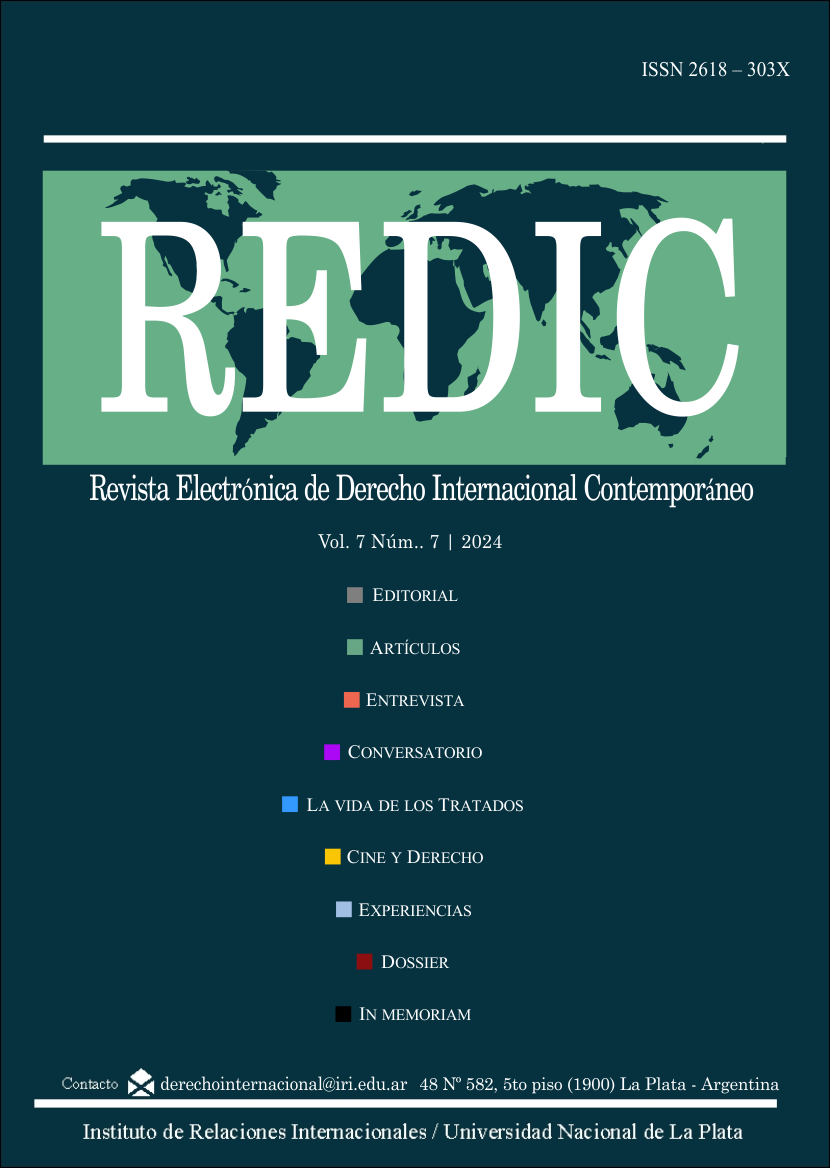Los criterios Plaumann frente a la emergencia climática
Una perspectiva constitucional europea
DOI:
https://doi.org/10.24215/2618303Xe077Palabras clave:
acceso a la justicia climática, Tribunal de Justicia de la UE, locus standi, criterios PlaumannResumen
Este artículo aborda las limitaciones de los criterios Plaumann en el acceso a la justicia climática ante el Tribunal de Justicia de la Unión Europea y propone una reinterpretación fundamentada en un enfoque constitucional europeo. Analiza cómo las restricciones impuestas por estos criterios dificultan que particulares y ONG puedan participar en la labor de control judicial de la UE en materia climática. En este contexto, este artículo aboga por un cambio en la jurisprudencia del TJUE sobre el acceso de las ONG a los tribunales de la UE en el contexto del cambio climático. A través de un enfoque evolutivo, se argumenta que las disposiciones constitucionales de la UE ofrecen una base sólida para flexibilizar estos criterios. Además, el artículo explora la influencia de litigios climáticos nacionales y del Tribunal Europeo de Derechos Humanos, así como la relevancia del Convenio de Aarhus en la reinterpretación de los criterios Plaumann en el contexto climático.
Referencias
Boyle, A. (2018). Climate change, the Paris Agreement and human rights. International & Comparative Law Quarterly, 67(4), 759-777. https://doi.org/10.1017/S0020589318000222
Core Writing Team, H. Lee and J. Romero (Eds.). (2023). Climate Change 2023: Synthesis Report. Contribution of Working Groups I, II and III to the Sixth Assessment Report of the Intergovernmental Panel on Climate Change. Intergovernmental Panel on Climate Change. https://doi.org/10.59327/IPCC/AR6-9789291691647
Cournil, C. y Perruso, C. (2018). Réflexions sur « l’humanisation » des changements climatiques et la « climatisation » des droits de l'homme. Émergence et pertinence. Revue des Droits de l’Homme, 14(14). https://doi.org/10.4000/revdh.3930
Craig, P. y de Búrca, G. (2020). EU law: Text, cases and materials. (7ª ed.). Oxford University Press.
Danthinne, A., Eliantonio, M. y Peeters, M. (2022). Justifying a presumed standing for environmental NGOs: A legal assessment of Article 9(3) of the Aarhus Convention. Review of European, Comparative & International Environmental Law, 31(3), 411-420. https://doi.org/10.1111/reel.12450
Fisher, E., Scotford, E. y Barritt, B. (2017). The Legally Disruptive Nature of Climate Change. The Modern Law Review, 80(2), 173-201. https://doi.org/10.1111/1468-2230.12251
Gallarati, F. (2023). Is climate emergency a constitutional emergency? A critical appraisal. The Italian Review of International and Comparative Law, 3, 448-468. https://doi.org/10.1163/27725650-03020015
García-Juanatey, A. y Steible, B. (2023). Resituating human rights within planetary boundaries: A promising narrative for peace and climate justice in the post-Ukraine world. Peace Review, 35(4), 588-602. https://doi.org/10.1080/10402659.2023.2262405
Gentile, G. (2022). Autonomous but interdependent: Constitutional traditions on judicial protection and the general principle of effective judicial protection. Maastricht Journal of European and Comparative Law, 29(6), 685-707. https://doi.org/10.1177/1023263X231158489
Hadjiyianni, I. (2021). Judicial protection and the environment in the EU legal order: Missing pieces for a complete puzzle of legal remedies. Common Market Law Review, 58(3), 777-812. https://doi.org/10.54648/cola2021050
Heri, C., Nordlander, L. y Savaresi, A. (2024). Recognizing the right to a healthy environment at the Council of Europe: Why does it matter? Environmental Rights Review, 1(2), 1-6. https://doi.org/10.5281/zenodo.10634738
Kalis, M. y Priebe, A.-L. (2024). The right to climate protection and the essentially comparable protection of fundamental rights: Applying Solange in European climate change litigation? Review of European, Comparative & International Environmental Law, 33(2), 265-275. https://doi.org/10.1111/reel.12560
Kelleher, O. (2021). Systemic climate change litigation, standing rules and the Aarhus Convention: A purposive approach. Journal of Environmental Law, 34(1), 107-134. https://doi.org/10.1093/jel/eqab037
Krämer, L. (2022). Article 47 of the Charter and effective judicial protection in environmental matters: The need to grant civil society the right to defend the environment. En M. Bonelli, M. Eliantonio y G. Gentile (Eds.), Article 47 of the EU Charter and Effective Judicial Protection: Volume 1: The Court of Justice’s Perspective (pp. 195-212). Hart Publishing.
Malingre, V. (26 de septiembre de 2024). L’avenir incertain du pacte vert européen, attaqué sur plusieurs fronts. Le Monde. https://www.lemonde.fr/planete/article/2024/09/26/l-avenir-incertain-du-pacte-vert-europeen-attaque-sur-plusieurs-fronts_6334306_3244.html
Milanovic, M. (9 de abril de 2024). A quick take on the European Court’s climate change judgments. EJIL: Talk! https://www.ejiltalk.org/a-quick-take-on-the-european-courts-climate-change-judgments/
O’Gorman, R. (2017). Environmental constitutionalism: A comparative analysis. Transnational Environmental Law, 6(3), 435-462. https://doi.org/10.1017/S2047102517000231
Oñate Díaz, J. A. (2023). El acceso a la justicia en el TJUE: el ius standi de los particulares como garantía del derecho a una tutela judicial efectiva. En C. Jiménez Sánchez y C. M. Zamora-Gómez (Coords.), El derecho humano de acceso a la justicia en tribunales internacionales (pp. 83-102). Editorial Comares.
Perruso, C. (2021). Les droits de l’Homme au service de la lutte climatique. En C. Cournil (Dir.), La fabrique d’un droit climatique au service de la trajectoire « 1.5 » (pp. 243-264). Pedone.
Puentes Riano, A., Boyd, D. R. y Knox, J. (5 de noviembre de 2024). Il faut inscrire le droit à un environnement sain dans le système des droits humains. La Croix. https://www.la-croix.com/a-vif/il-faut-inscrire-le-droit-a-un-environnement-sain-dans-le-systeme-des-droits-humains-20241105
Rhimes, M. (2016). The EU courts stand their ground: Why are the standing rules for direct actions still so restrictive? European Journal of Legal Studies, 9, 103-163.
Richardson, K., Steffen, E., Wolfgang Lucht, J. B., Cornell, S., Donges, J., Druke, M., Fetzer, I., Govindasamy, B., von Bloh, W., Feulner, G., Fiedler, S., Gerten, D., Gleeson, T., Hofmann, M., Huiskamp, W., Kummun, M., Mohan, C., Nogués-Bravo, D., Petri, S., …Rockström, J. (2023). Earth beyond six of nine planetary boundaries. Science Advances, 9(37). https://doi.org/10.1126/sciadv.adh2458
Rockström, J., Steffen, W., Noone, k., Persson, Å., Chapin, III F. S., Lambin, E., Lenton, T. M., Scheffer, M., Folke, C., H. Schellnhuber, H., Nykvist, B., De Wit, C. A., Hughes, T., van der Leeuw, S., Rodhe, H., Sörlin, S., Snyder, P. K., Costanza, R., Svedin, U. … Foley, J. (2009). Planetary boundaries: Exploring the safe operating space for humanity. Ecology and Society, 14(2).
Salmón, E. (Coord.). (2020). Cambio climático y derechos humanos. Pontificia Universidad Católica del Perú.
Sánchez Frías, A. (2023). Los conceptos autónomos en el Derecho de la Unión Europea. Tirant Lo Blanch.
Savaresi, A. y Setzer, J. (2022). Rights-based litigation in the climate emergency: Mapping the landscape and new knowledge frontiers. Journal of Human Rights and the Environment, 13(1), 7-34. https://doi.org/10.4337/jhre.2022.01.01
Schmitt, F. (14 de noviembre de 2024). La loi sur la déforestation déclenche une nouvelle tempête politique à Bruxelles. Le Point. https://www.lesechos.fr/monde/europe/la-loi-sur-la-deforestation-declenche-une-nouvelle-tempete-politique-a-bruxelles-2131617
Simon, D. (2008). Le traité de Lisbonne: Oui, non, mais à quoi? Europe, 7, 24-138.
United Nations Environment Programme. (2023). Global Climate Litigation Report. 2023 Status Review. https://doi.org/10.59117/20.500.11822/43008
van Wolferen, M. y Eliantonio, M. (2020). Access to justice in environmental matters: The EU’s difficult road towards non-compliance with the Aarhus Convention. En M. Peeters y M. Eliantonio (Eds.), Research Handbook on EU Environmental Law (pp. 148-163). Edward Elgar.
Winter, G. (2020). Armando Carvalho and others v. EU: Invoking human rights and the Paris Agreement for better climate protection legislation. Transnational Environmental Law, 9(1), 137-164. https://doi.org/10.1017/S2047102520000072
Winter, G. (2023). Plaumann withering: Standing before the EU General Court underway from distinctive to substantial concern. European Journal Of Legal Studies, 15(1), 85-123. https://doi.org/10.2924/EJLS.2023.008
Archivos adicionales
Publicado
Número
Sección
Licencia
Derechos de autor 2024 Bettina Steible

Esta obra está bajo una licencia internacional Creative Commons Atribución-NoComercial-CompartirIgual 4.0.
Aquellos autores/as que tengan publicaciones con esta revista, aceptan los términos siguientes:
- Los autores/as conservarán sus derechos de autor y garantizarán a la revista el derecho de primera publicación de su obra, el cuál estará simultáneamente sujeto a la Licencia de reconocimiento de Creative Commons (BY-NC-SA) 4.0 que permite a terceros compartir la obra siempre que se indique su autor y su primera publicación esta revista, no se haga uso comercial, y si se remezcla, se transforma o se crea a partir del material, se debe distribuir bajo la misma licencia del original.
- Los autores/as podrán adoptar otros acuerdos de licencia no exclusiva de distribución de la versión de la obra publicada (p. ej.: depositarla en un archivo telemático institucional o publicarla en un volumen monográfico) siempre que se indique la publicación inicial en esta revista.
- Se permite y recomienda a los autores/as difundir su obra a través de Internet (p. ej.: en archivos telemáticos institucionales o en su página web) antes y durante el proceso de envío, lo cual puede producir intercambios interesantes y aumentar las citas de la obra publicada. (Véase El efecto del acceso abierto).































